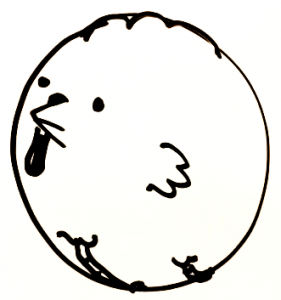Title: Elephant Volume
General Information about Item:
- Joke
- English
- United States
Informant Data:
- Sarah Rote is a Dartmouth 18 studying environmental engineering. She’s a 21 year old from Newton Square, Pennsylvania.
Contextual Data:
- Social Context
- This joke would be shared among peers during casual conversation for humorous effect. It would likely be exclusively shared among engineers who would find enjoyment in the self-deprecating humor, or among people of neighboring STEM fields in order to mock engineers.
- Cultural Context
- This joke hits upon a similar vein of cultural context as the “Sick Chicken” joke–the act of simplification for modeling engineering designs. A model that is overly simplified is a bad design, and so this joke mocks a “bad” engineer by exaggerating a trait that is stereotypically associated with engineers–the simplification of systems. What’s more, it draws on the cultural climate around mathematicians and physicists. Mathematicians are known for working almost exclusively in theoretical domains, so they rarely ever simplify. Math is concerned with exactness and precision, and so some of the joke’s humor derives from emulating this archetype–the mathematician takes the most precise, and the most computationally heavy approach. Triple integration is the most precise and mathematically pure means of volume computation. The physicist emulates his own stereotype–the experimentally-driven. Physicists run physical experiments, unlike mathematicians, so the physicist takes a very practical approach to volume calculation–water displacement. Then the engineer, as the punchline, is caught in the act of over-simplification just as the engineer in the Sick Chicken joke. He hazards a guess at the radius–not bothering with exact measurements and implying that he intends to model the elephant as a sphere.
Item:
A mathematician, a physicist, and an engineer are at the circus. They ask each other what is the approximate volume of an elephant.
The mathematician starts drawing a triple integral and solving a complicated equation.
The physicist says, “We need a tank of water this big. We’re going to put the elephant in and measure the displacement.”
The engineer stretches out his arms and says, “Approximate radius of the elephant.”
Transcript:
- Chrissy: Could you state your name and background?
- Sarah: My name is Sarah. I’m an 18 studying environmental engineering.
- Chrissy: And can you tell me what your joke is?
- Sarah: Uh, a mathematician, a physicist, and an engineer are at the circus. They ask each other what is the approximate volume of an elephant. The mathematician starts drawing a triple integral and solving a complicated equation. The physicist says “We need a tank of water this big, gonna put the elephant in and measure the displacement.” The engineer stretches out his arms and says “Approximate radius of the elephant.”
- Chrissy: (laughs) Could you tell us, uh, when–do you remember when you first heard the joke?
- Sarah: I mean I think I read it online but I don’t remember the exact setting.
- Chrissy: And can you give kind of a brief explanation of the joke. What about engineering culture makes it funny?
- Sarah: Um, about the engineer, its that–make very broad approximations of real life. As in, an elephant is not a sphere. The mathematician makes it very exact, but the engineers approximate a lot.
Associated file (a video, audio, or image file):
Informant’s Comments:
Collector’s Comments:
Collector’s Name: Christina Long
Tags/Keywords:
- Joke. Elephant volume. Engineering. Circus.



